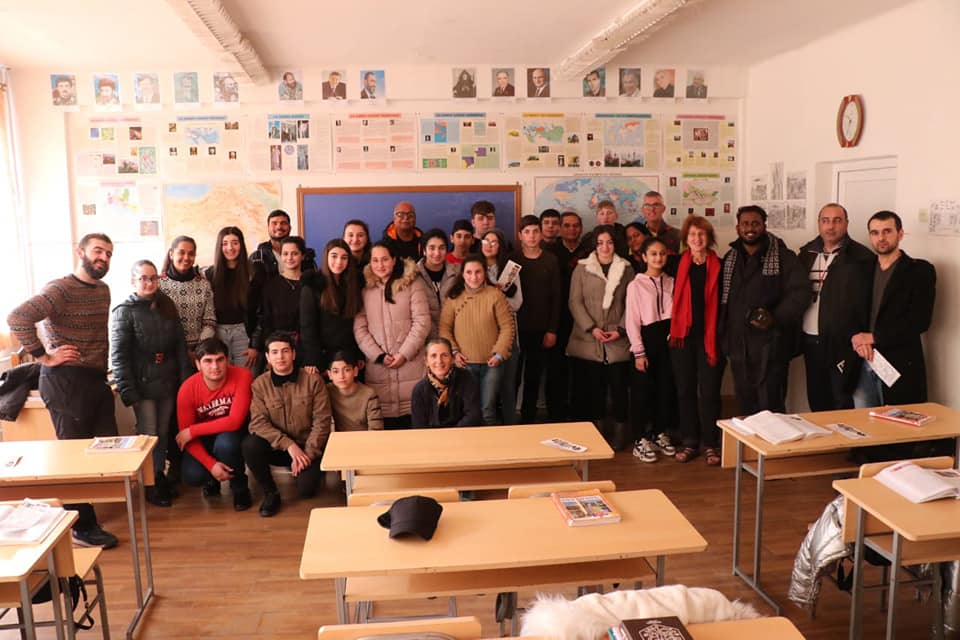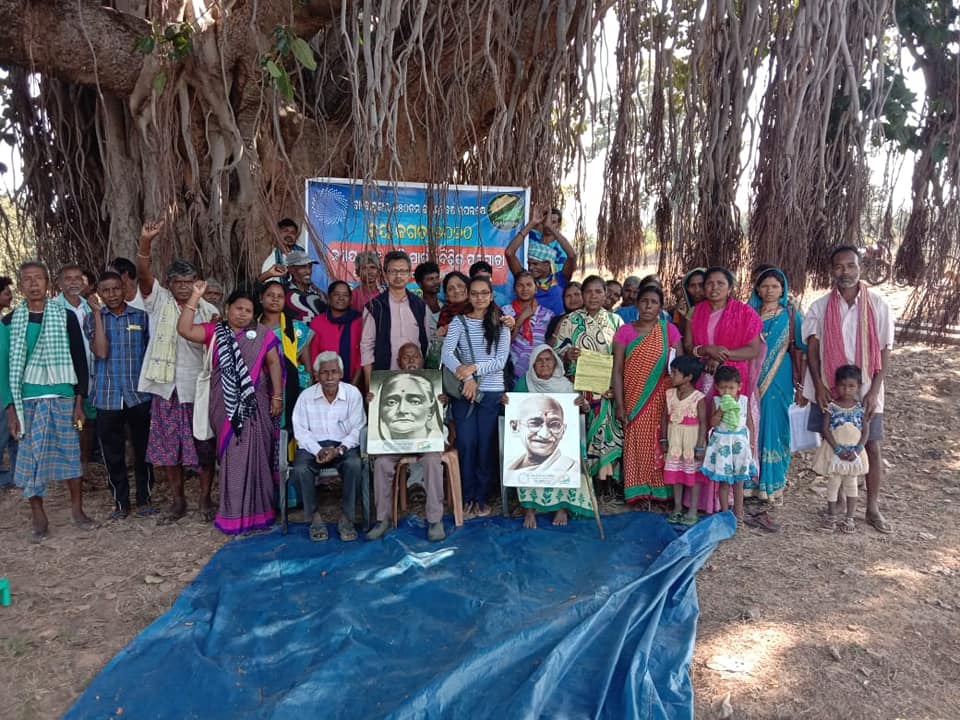Minds of the Movement
An ICNC blog on the people and power of civil resistance
by Amber FrenchFebruary 25, 2020
-- Listen to an excerpt of ICNC's interview with Ramesh Sharma, National Coordinator of Ekta Parishad. --
“Day 141: Today the padyatra visited No 13 public school – Kapan [southeast Armenia], to interact with children from the 8th grade. They were really interested about Jai Jagat as it is a walk from Delhi to Geneva which was surprising for them. It was a nice interaction as the children learned about Jai Jagat and Ahimsa [nonviolence] from the Padyatrees.
After this interaction, the padyatrees began their walk from Kapan to Artsvanik. It was a tough walk as they were walking uphill. But all the troubles were overshadowed by the scenic beauty of Armenia and specially in today's route…”
February 20, 2020, Jai Jagat 2020 Facebook page
On October 2, 2019—150 years to the day after the birth of Mohandas Gandhi—50 people from the Gandhian organization Ekta Parishad departed from the Raj Ghat memorial, dedicated to Gandhi, in Delhi. It was Day One of what will be a year-long journey on the Global March for Justice and Peace.
With a jaw-dropping itinerary of 11,000 kilometers winding through 10 countries on the way to Geneva, 50 core marchers are receiving support from, and being joined by, self-organized local groups along the way. Core marchers have committed to walking every day for one year, calling on the international community for concrete action to eradicate poverty, address the climate emergency, promote social inclusion, and reduce violent conflict.
Last month, I had the pleasure of speaking with Ramesh Sharma, National Coordinator of Ekta Parishad, one of the march’s main organizers. Since October, Ramesh has been shuttling back and forth by train between the march and Delhi to seek his home government’s guidance on diplomatic and international issues involved in crossing numerous borders and making appeals to a variety of foreign officials.

Jai Jagat marchers meet with schoolchildren in Kapan, Armenia, February 20, 2020. Source: Jai Jagat 2020 Facebook page.
Yet Ramesh’s role extends well beyond the diplomatic sphere. His team has been coordinating with the groups in Iran, Armenia, Georgia, Serbia, and beyond who will be joining the core marchers for tens of kilometers as they pass through on their way to Geneva. As part of their campaign, Ekta Parishad organizes meetings at local schools and community centers, and notably held a global peace convention in Gandhi’s ashram in Maharastra, central India, several weeks ago.
Global goals, global vision
This year marks the 75th anniversary of the formation of the United Nations (U.N.). Ramesh said march organizers “felt it was our responsibility to reach out to the U.N… the most powerful organization in the world and [which] reflects the collective wisdom of states and global citizens.” One of their goals is to appeal to the U.N. to declare 2020-2030 as the International Decade for Peace.
Other concrete goals of the march are to pressure the governments of countries through which they pass to set up a ministry of peace and to popularize, institutionalize, and formalize peace education in elementary education. Nothing of the like currently exists in formal education systems.
When asked why this itinerary was selected, Ramesh modestly replies: “If you want to walk, probably Geneva would be a little more realistic place for us, because we can walk in from the surface. If you choose New York, then probably it would be very difficult, because in that case we’d have to take a ferry or flight or something. So logistically, Geneva is more convenient, it’s more appropriate for us.” The word convenient gives me pause.
Ramesh adds that Ekta Parishad has organized many successful marches in India, so they felt ready to attempt a march on a global scale.
Roughly 100 people are marching on any given day: the 50 core marchers, along with some 50 others who join for a few hours or days before peeling off. So far, the core marchers have crossed through six states of India and, as of this writing, are in Armenia, at a pace of roughly 25 to 30 kilometers per day. They’ve covered more than 2,000 kilometers so far since last October.

Marchers visit the Lohar community in Simga, who for years suffered from forced displacement and discrimination. With the help of Ekta Parishad and others, the community finally obtained land in 1998. Source: Jai Jagat 2020 Facebook page.
The core marchers are comprised of:
- Indian men, women, youth, and elders from diverse grassroots communities, nomad groups, and tribes, as well as Dalits;
- Non-Indians hailing from Europe, Latin America, Asia, and Africa;
- Members of Ekta Parishad and many other like-minded organizations; and
- Young people motivated by a variety of social causes.
Local groups self-organize to support the march
“This whole campaign is actually built with the help of a large number of organizations working in different countries,” Ramesh explains. Local organizations dotting their itinerary are serving as posts for Ekta Parishad, supplying volunteers to join the march. When it comes to logistics—medical assistance, food, water, shelter, meeting space—everything is managed by the host organizations, each of which are conducting their own fundraising. Ekta Parishad and these groups receive donations from open sources and foundations, as well as smaller online donations.
In addition to the march originating in Delhi, 10 marches are already being planned in France, Germany, Spain, Switzerland, Sweden, United Kingdom, and Belgium—all of which will reach Geneva by foot at the same time.
Accomplishments and challenges
One of the main challenges they face is gaining media attention (we here at Minds of the Movement are doing our part to help them with this!). Later via WhatsApp, Ramesh adds, “…and -10 degrees C weather 😊” as they reached Kapan, Armenia a few days ago.
Nevertheless, in the first 140 days of the march, it has received positive responses from all sides. Fundraising progress continues. The Madhya Pradesh government (India) showed its support, with Chief Minister Shri Kamal Nath coming to visit marchers three times in the first 100 days even.
Ramesh tells me that they are also now in dialogue with the U.N. Human Rights Council and the U.N. Environment Programme to drum up support for their three main goals. There has been a “positive response” so far in those dialogues and “progress is satisfactory,” he adds somewhat vaguely but promisingly.
The road to Geneva is long, but spring is just on the horizon. Groups across Europe are already gearing up to hit the road soon, and it’s precisely this infusion of solidarity from local groups along the way that keeps morale high. Everyone seems to be in it for the long haul—the long haul toward justice and peace.
-
Check out the Jai Jagat 2020 Facebook page to follow the march in real time.

Amber French
Amber French is Senior Editorial Advisor at ICNC, Managing Editor of the Minds of the Movement blog (est. June 2017) and Project Co-Lead of REACT (Research-in-Action) focusing on the power of activist writing. Currently based in Paris, France, she continues to develop thought leadership on civil resistance in French.
Read More